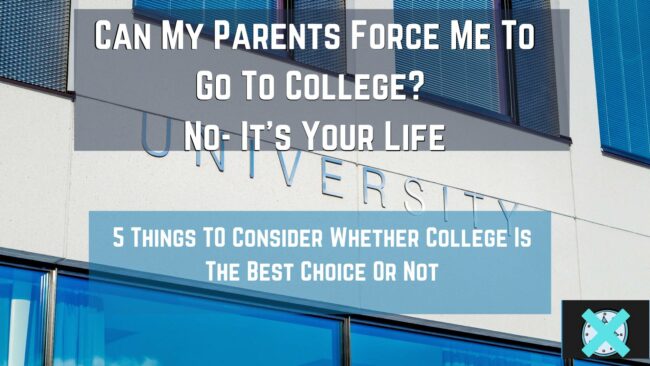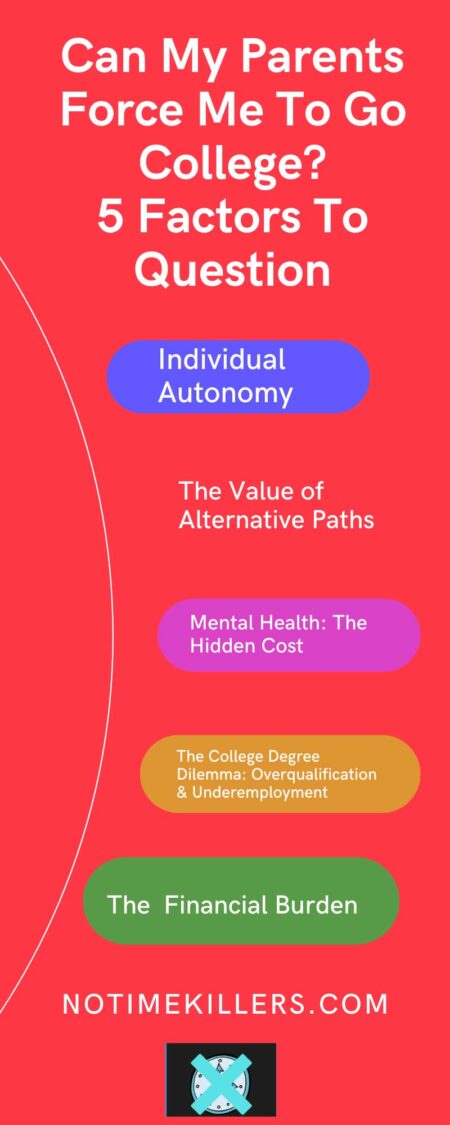Right before I graduated high school, I went through a dilemma about what I wanted to do afterward. If you’re like many high school students (or recent graduates), you may ask yourself, can my parents force me to go to college?
In reality, the answer is no. The choice to go to college is ultimately up to the individual because this decision will significantly affect their life.
This question swivels around many high school students as they make pivotal decisions about their future.
In this post, I will discuss the societal expectations for young adults to attend college.
I will also review five factors to consider when weighing the downsides of taking the path toward higher education.
Note: We may include products or services that will be helpful to our readers. This post may contain affiliate links. For more information, please review the affiliate disclosure page.
- The Societal Pressure: A One-Way Ticket To College?
- The Cornerstone of Personal Growth: Individual Autonomy
- Pioneering Success: The Value of Alternative Paths
- Mental Health: The Hidden Cost of Forced Decisions
- The College Degree Paradox: Overqualification And Underemployment
- The Financial Burden: Weighing the Cost of College Education
- A Better Alternative: The Entrepreneurial Pathway

Can my parents force me to go to college?
Absolutely not. The decision to go to college should ultimately rest with the child, as it is their future and their life that this choice will most profoundly impact.
The societal pressure: A one-way ticket to college?
A wave of societal pressure descends upon high school students in the wake of graduation.
From a young age, we are taught that success follows the standard, traditional path. That is the following:
- Do well in school
- Get into a good college, graduate, and secure a high-paying job.
- Work at a prestigious company, contribute to a 401K and work for the next 40+ years until retirement
This ingrained societal norm creates immense pressure on parents and students, often leading to the assumption that college is an unquestionable must.
Under the weight of these societal expectations, parents may feel that they’re safeguarding their children’s future by pushing them toward higher education.
In many ways, our society equates the idea of success with a college degree, overlooking the fact that everyone’s journey to success is different and unique.
What students end up going into
Students, too, find themselves swayed by these expectations. There is a fear of diverging from this traditional path, a fear of failure or not fitting in.
This societal pressure is so potent that it can blur the line between personal aspiration and societal expectations.
It makes it difficult for students to assert their autonomy and make decisions that truly align with their passions and interests.
However, in a rapidly evolving world, it’s essential to debunk this one-size-fits-all notion of success.
A college degree isn’t the only ticket to a fulfilling career or a successful life.

The cornerstone of personal growth: Individual autonomy
Central to this choice is the concept of individual autonomy, a cornerstone of personal development.
Autonomy, or the freedom to govern one’s own life and choices, plays a crucial role in fostering self-confidence, independence, and decision-making skills.
We grow as individuals by making our own decisions and learning from the consequences, good or bad.
Undermining autonomy
However, when parents insist on their children attending college, they inadvertently undermine this autonomy.
Their actions can convey a troubling message to the child: that they are incapable of making important life decisions independently.
Let’s consider the case of Emily, a budding artist forced to study engineering by her parents. Emily struggled through college, unhappy and unmotivated.
After graduating, she abandoned her degree and pursued her passion for art. This period of unhappiness could have been avoided had Emily’s autonomy been respected.
Pioneering success: The value of alternative paths
Recognizing alternative paths to success beyond a traditional college education is also essential.
Trade schools, apprenticeships, and entrepreneurship offer fulfilling careers, often with less financial burden.
We live in a rapidly evolving digital age where careers are not necessarily bound to degrees anymore.
A prime example is Bill Gates, co-founder of Microsoft. Gates dropped out of Harvard to start what would become one of the most successful tech companies in the world.
His story is a testament to the fact that a traditional college education isn’t the only pathway to success.
Is it ok if I don’t want to go to college?
It’s okay for someone not to want to go to college. In today’s diverse and evolving world, numerous alternatives to higher education can lead to fulfilling and successful careers. Alternatives to traditional college education can include trade schools, apprenticeships, entrepreneurship, online courses, and self-learning programs.
Moreover, the impact of coerced decision-making on a child’s mental health cannot be overlooked.
The pressure of living up to parental expectations, especially when they diverge from the child’s aspirations, can lead to stress, anxiety, and burnout.
Consider the case of Hannah, who developed severe anxiety while pursuing a medical degree under her parents’ insistence, despite her love for theatre.
She took a gap year to focus on her mental health, subsequently switching to a theatre arts program, where she thrived and excelled.
A relevant article from notimekillers.com
Read next on “If I Don’t Go To College, Is My Life Over? Why To NOT Panic” to learn whether going to college is the end-all-be-all in life or not.
The college degree paradox: Overqualification and underemployment
The fourth reason to reconsider mandating a college degree for kids is the rising problem of overqualification and underemployment.
In recent years, we’ve seen an influx of college graduates in the job market, resulting in many ending up in jobs that don’t require a degree.
It can lead to frustration and a sense of wasted effort and resources.
Consider the example of Jordan, who graduated with a degree in biology, hoping to work in a related field.
Despite his qualifications, he couldn’t find a job in his field due to market saturation and ended up working in a retail position.
With the burden of student loans and realizing that his degree isn’t contributing to his current job, Jordan felt his time in college didn’t pay off as he’d expected.
The financial burden: Weighing the cost of college education
The fifth reason centers around the hefty financial burden a college education can impose.
Skyrocketing tuition fees coupled with the potential for student loan debt can put a significant financial strain on students and their families, which could last for decades.
Let’s take the example of Lily. She attended a prestigious private university to study finance under her parents’ pressure.
After graduating, she was saddled with massive student loan debt.
Even with a decent job, she struggles to make her loan payments while also trying to make ends meet, save for retirement, and plan for a family.
Lily would have preferred attending a community college or seeking financial certification programs if she had been allowed to choose.
In that case, it would have cost much less and still allowed her to work in her field of interest.
A relevant article from notimekillers.com
Read next on “Is Now A Good Time To Start An Online Business? Of Course!” to learn whether going the online route is the best path to go on.
Final Words
So, for those who are undecided, remember that there are alternative paths to success, and the decision is ultimately yours to make.
The most rewarding path is often the one you carve for yourself. Because your path is, and should always be, your choice.
A better alternative: The entrepreneurial pathway
This brings us to an exciting alternative to traditional education: starting an online business.
There are platforms that offer individuals the chance to learn valuable digital skills and start their own online business.
Not only does this path encourage creativity and independence, but it also allows young adults to enter the workforce early and potentially achieve financial independence sooner.
Wealthy Affiliate provides comprehensive training, tools, and support to build a profitable online business.
As a Wealthy Affiliate premium member, you get help in three effective ways:
- Core training modules: Wealthy Affiliate provides foundational training in four simple steps:
- Finding an interest you’re passionate about.
- Building a straightforward and effective website.
- Acquiring free traffic to your site.
- Generating revenue from your online presence.
2. One live weekly expert class: Every week, there’s a live expert class providing the latest tips and strategies to grow your online business- strategies that are working right NOW in the ever-evolving digital landscape.
3. Private messaging and support: What truly sets Wealthy Affiliate apart is the personalized support you receive. That includes private messaging and direct assistance from myself and the co-founders. You get the chance to work directly with “the CEOs,” receiving first-hand advice from those who’ve been successful in this field.
I encourage you to sign up for a free starter account with Wealthy Affiliate. Give it a test drive, explore its features, and see how it can potentially transform your entrepreneurial journey.
When ready to unlock even more resources and benefits, you can upgrade to a premium account.
You have nothing to lose and everything to gain. Let Wealthy Affiliate be your guide as you step into entrepreneurship.

Your Turn: Will you be forced to go to college?
I would like to get some feedback on this topic. Here’s some food for thought:
- What are your thoughts on the traditional college path versus alternative routes to success?
- Have you or anyone you know taken a non-traditional path that led to a fulfilling career?
- Have you ever felt pressured to go to college? If yes, how did you handle that pressure?
- Would you recommend others to consider alternatives to higher education?
Feel free to share your thoughts by leaving a comment below. I look forward to reading your responses and’ll gladly respond promptly.
If you got value from this article, please bookmark this website to visit later for new posts every week. Spread the word to others. Sharing is caring! To get more of this type of content, you won't want to miss out my daily email letters. These are worth some golden nuggets and best tips to help you in your business. Sign up today! Count me in on the daily letters via email! For the latest videos that come out every week, subscribe to the YouTube channel. Also, be sure to check out our new space on Twitter X! YouTube Twitter (X) Medium Profile
Eric is the owner and chief editor of notimekillers.com. He takes great pride in helping people manage their time and grow their businesses. Eric is a firm believer in financial and time freedom, as he believes in financial independence and taking ownership of your time. “Time is your most important asset. It can be your best friend or worst enemy. How you use your time can shape the future you desire to have.” In his leisure time, Eric loves to write and read whenever possible. He enjoys going for long walks outdoors while doing in-home workout videos every week. You can also connect with Eric via LinkedIn.


I always think that there is no waste in studying, being in college, or any other type of studying. Now the most important thing is the goal that one is pursuing with the study.
You can just study to please your parents- that is the wrong goal ever. But you need to have the job or the business you want to build with your study.
Thanks.
Hello,
I would not disagree with that point. I think it’s something to consider as someone wants to look into their options.
So it depends-, but as I mentioned, I don’t believe parents should force their children to go to college. Ultimately, that should be up to them to decide.
But I appreciate what you have to say. Thank you very much for sharing your thoughts.